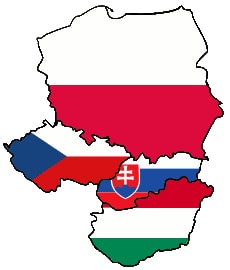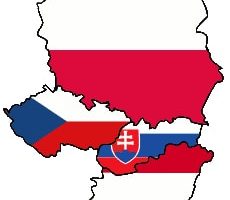The Visegrad Group, which unites Czech Republic, Poland, Slovakia and Hungary in a cultural and political alliance, has become more visible and controversial after recent events. The migration crisis involving Europe triggered the reaction of the Group, which took a very strong and restrictive position in the matter. Furthermore, domestic reforms in Poland and Hungary have caused concerns and doubts about the condition of democracy in that region. However, the Visegrad Group has existed long after the migration and asylum policies, as it went through four main stages.

In the first place the Visegrad was a value based and fairly idealistic group. Although there was always a political component even from the initial meetings, the three states that formed part of the group at that time essentially wanted to distance themselves from the East that was disintegrating, to rejoin the West to which they felt they belonged given their culture and traditions. The countries, their leaders and societies then adapted this desire for the West into economic and political reforms. The Visegrad countries gradually became the example of post-communist process of changing.
After 2004 and the expansion of the EU, the old members and Germany in particular, noticed a new and different behaviour from the usual one.
The Visegrad states that always accepted and adapted to European laws and standards, taking Germany as a leader and example to look up to, decided at a certain point not to accept it anymore and refuse that subordinate role. For instance, while still in the process of entering to the Union, the four countries supported the US in the Iraq conflict thus distancing them from the European standpoint. On the other side Poland also tried to block the attempt of some countries, among which Germany, to introduce a new system of voting for the EU council, which was seen as a main institutional change to make EU more accessible to new members.
Although these oppositions, Visegrad kept on its process of reformation and renewal that started prior to 2004. The Visegrad members of the EU completed their induction whilst Slovakia entered the euro zone, and a big and steady influx of foreign direct investments and EU funds strengthened the region’s economy. From 2009 until 2011 the Visegrad states proved to be rightful members of the European community and not just mere affiliates, after every favourable turn at EU council presidencies. Even more important was that the Group supported the German program of fiscal conservatism and hard adjustments in the economy after the debt crisis that hit Europe. This appeared as a transition from the old East towards the new North and a positive change of image to the eyes of the Union.
Eventually came the refugee crisis in 2015 that showed an obstinate and restrictive side of Visegrad. All the four countries of the region have been inflexible and refused the idea of compulsory policies for the distribution of demanders of asylum in the EU. To justify this, the Group claims to the concept of flexible solidarity. They say migration is an ordinary problem of Europe so it shouldn’t be solved by dividing refugees among the country members but instead by improving support in the crisis critical regions and improving border security. Meanwhile, the Polish and Hungarian governments have also highlighted their decision to push through domestic agendas of radical change and to defend national sovereignty. Both countries stated that they will not allow the Union to interfere with their decisions in topics regarded as the essence of their statehood, such as the so discussed control of migration.
The Visegrad Group has evidently gone through different phases since its birth and will surely keep changing in the future, so that its fellow EU members will have to deal with its many sides, the defying along with the innovative and cooperative one.
Germany will have a fundamental role, being the closest and most important country in the V4 area and also having the weight of keeping the EU together on its shoulders. It will be a good possibility to strengthen connections and accept the diversities among the region.
Visits: 96

